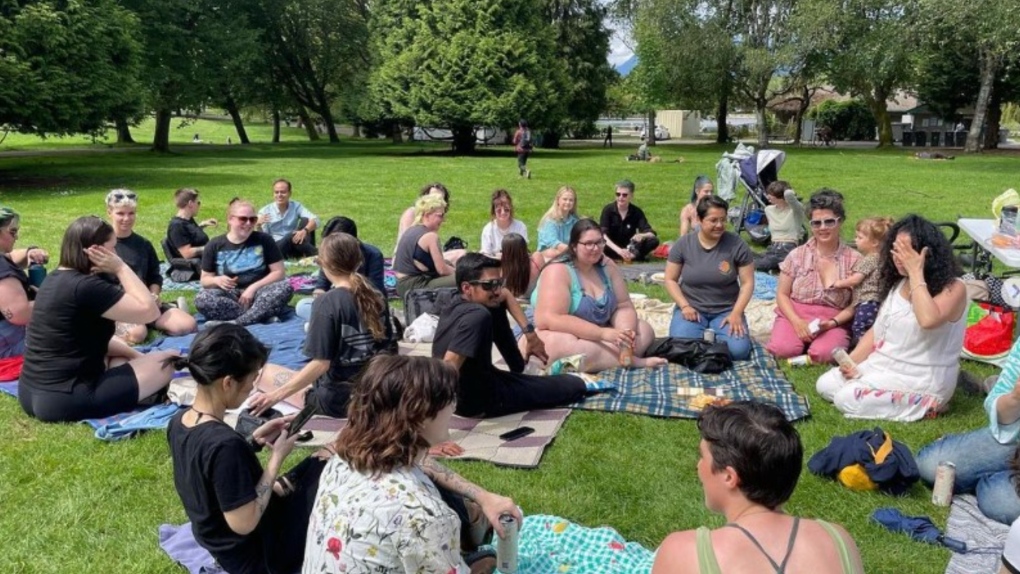No interest in Dry January? 'Damp January' might be more your speed, says Sober Babes co-founder
 A photo from a alcohol-free picnic organized and hosted by Sober Babes Vancouver (Instagram).
A photo from a alcohol-free picnic organized and hosted by Sober Babes Vancouver (Instagram).
Giving up booze for “Dry January” has become an annual tradition for some – but the co-founder of Sober Babes Vancouver believes there are plenty of benefits to a less-restrictive “Damp January” as well.
Limiting alcohol intake without going cold turkey is a great option for people interested in exploring their relationship with drinking, said Mic Deane, a 25-year-old Irish expat who practices sobriety to support her mental health.
Deane told CTV News she tried doing Dry January last year, before she had given up alcohol entirely, and didn’t quite last the full month. She describes the process of giving up drinking as a marathon – and one that, for many people, requires some warm-up time.
“It’s not just a switch where you go from drinking every weekend with your friends to complete sobriety,” she said.
When she moved to Vancouver in 2019, Deane found it difficult to cut back on drinking booze because of how normalized it is in society.
“It’s how you celebrate or deal with everything—you could be at weddings, funerals—every event seems to always somehow revolve around alcohol,” Deane said.
The problem with Alcoholics Anonymous, says Deane, is that it’s centred around a spiritual practice, and she doesn’t identify as an alcoholic. When she couldn’t find her own alcohol-free community, she decided to create one with a recently sober friend, Zalika Jody.
Since launching Sober Babes Vancouver through Instagram, the account has amassed nearly 2,000 followers.
Through social media, Deane and Jody organize alcohol-free meet ups, including paint nights and drag shows.
“Becoming friends with someone who was sober made me see—OK, this could really benefit my life, I could do that, and I really hope that’s something people can take away from our events,” said Deane.
For anyone looking to reduce their drinking in January or beyond, the Canadian Centre on Substance Use and Addiction suggests choosing drinks with a lower percentage of alcohol, and drinking a non-boozy drink for every potent one consumed.
In addition, the centre suggests trying out some alcohol-free cocktail recipes, having a pitcher of water on hand while enjoying booze, and to drink slowly in small sips.
“I’m never going to be the one to preach sobriety,” said Deane. “With damp January, I think it’s just about what works best and what’s easiest for you. They’re all steps and they’re all important steps.”
Data by the Canadian Centre of Substance Use and Addiction shows 40 per cent of Canadians consume more than six standard drinks per week—triple the amount recommended in the nation’s low-risk drinking guidelines, which were updated in August.
According to the centre, only 20 per cent of Canadians abstain from drinking altogether, while 21 per cent of the population drinks within the recommended guidelines.
CTVNews.ca Top Stories

BoC widely expected to cut interest rates today, odds leaning toward half-point cut
The Bank of Canada is set to make its final interest rate announcement of the year this morning.
Tensions rising between Canada Post, union as strike nears four-week mark
Canada Post and the union representing postal workers are in a war of words as a countrywide strike enters its 27th day.
'They thought he wasn't making it': B.C. soccer star's family on his shocking shooting — and remarkable recovery
Born and raised in Metro Vancouver, Nathan Demian was living his dream playing soccer for top-ranked Ohio State University, when he was shot during a post-game pizza run with his brother Saturday night.
MPs approve $21.6B in supplementary spending; Conservatives vote against
Parliament has approved $21.6 billion in government spending, in a late Tuesday vote in the House of Commons.
Luigi Mangione shouts as he is led into courthouse where he contests extradition to N.Y.
The suspect in the killing of UnitedHealthcare’s CEO struggled with deputies and shouted Tuesday while arriving for a court appearance in Pennsylvania, a day after he was arrested at a McDonald’s and charged with murder.
What financial experts wish you knew about divorce
Divorce is a major financial reset, yet also one of the worst times to make a lot of important decisions, according to financial experts.
Dolly Parton explains why her longtime husband doesn't attend events with her
Dolly Parton has been married for 58 years, but you probably could count on one hand the times you have seen her with her husband.
Trudeau set to speak with premiers to tackle Trump's tariff plan
Prime Minister Justin Trudeau is set to meet with provincial and territorial premiers this afternoon to talk Canada-U.S. relations.
Waterloo Region mistakenly applied $13.7M discount to Amazon build in Blair
The Region of Waterloo will not be able to demand $13.7 million from a developer after they said a discount was mistakenly issued for the development of an Amazon fulfillment centre.

































